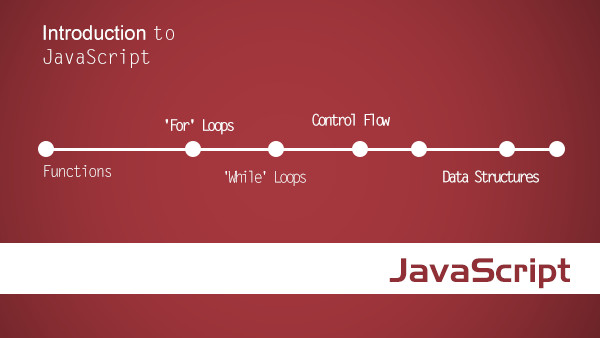高级前端进阶(id:FrontendGaoji)
作者:木易杨,资深前端工程师,前网易工程师,13K star Daily-Interview-Question 作者

引言
上篇文章介绍了构造函数、原型和原型链的关系,并且说明了 prototype、[[Prototype]] 和 __proto__ 之间的区别,今天这篇文章用图解的方式向大家介绍原型链及其继承方案,在介绍原型链继承的过程中讲解原型链运作机制以及属性遮蔽等知识。
建议阅读上篇文章后再来阅读本文,链接:【进阶5-1期】重新认识构造函数、原型和原型链
有什么想法或者意见都可以在评论区留言。下图是本文的思维导图,高清思维导图和更多文章请看我的 Github(https://github.com/yygmind/blog),阅读原文可看。

原型链
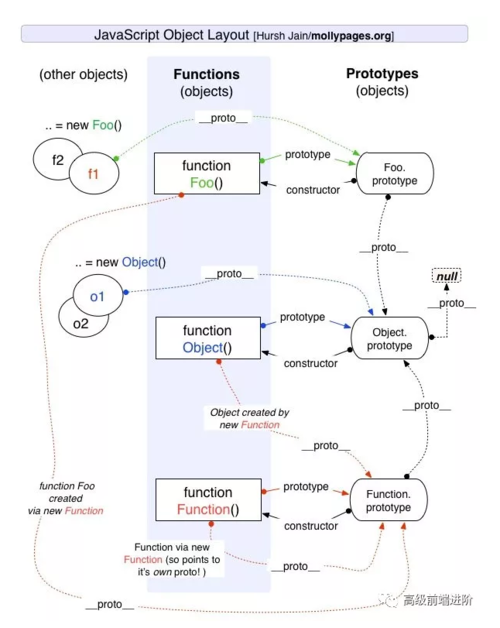
上篇文章中我们介绍了原型链的概念,即每个对象拥有一个原型对象,通过 __proto__ 指针指向上一个原型 ,并从中继承方法和属性,同时原型对象也可能拥有原型,这样一层一层,最终指向 null,这种关系被称为**原型链 **(prototype chain)。
根据规范不建议直接使用 __proto__,推荐使用 Object.getPrototypeOf(),不过为了行文方便逻辑清晰,下面都以 __proto__ 代替。
注意上面的说法,原型上的方法和属性被 继承 到新对象中,并不是被复制到新对象,我们看下面这个例子。
// 木易杨
function Foo(name) {
this.name = name;
}
Foo.prototype.getName = function() {
return this.name;
}
Foo.prototype.length = 3;
let foo = new Foo('muyiy'); // 相当于 foo.__proto__ = Foo.prototype
console.dir(foo);
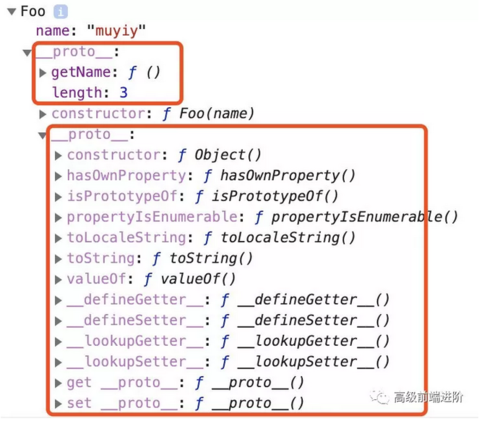
原型上的属性和方法定义在 prototype 对象上,而非对象实例本身。当访问一个对象的属性 / 方法时,它不仅仅在该对象上查找,还会查找该对象的原型,以及该对象的原型的原型,一层一层向上查找,直到找到一个名字匹配的属性 / 方法或到达原型链的末尾(null)。
比如调用 foo.valueOf() 会发生什么?
首先检查
foo对象是否具有可用的valueOf()方法。如果没有,则检查
foo对象的原型对象(即Foo.prototype)是否具有可用的valueof()方法。如果没有,则检查
Foo.prototype所指向的对象的原型对象(即Object.prototype)是否具有可用的valueOf()方法。这里有这个方法,于是该方法被调用。
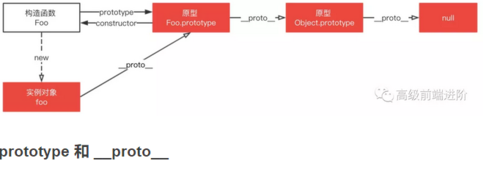
prototype 和 __proto__
上篇文章介绍了 prototype 和 __proto__ 的区别,其中原型对象 prototype 是构造函数的属性,__proto__ 是每个实例上都有的属性,这两个并不一样,但foo.__proto__ 和 Foo.prototype 指向同一个对象。
这次我们再深入一点,原型链的构建是依赖于 prototype 还是 __proto__ 呢?
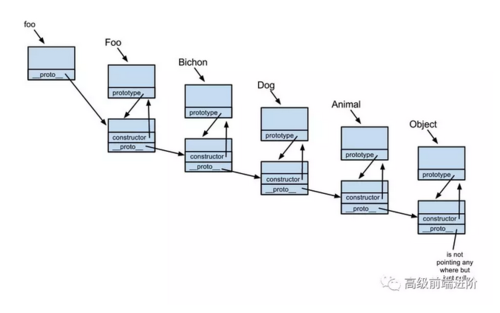
Foo.prototype 中的 prototype 并没有构建成一条原型链,其只是指向原型链中的某一处。原型链的构建依赖于 __proto__,如上图通过 foo.__proto__ 指向Foo.prototype,foo.__proto__.__proto__ 指向 Bichon.prototype,如此一层一层最终链接到 null。
可以这么理解 Foo,我是一个 constructor,我也是一个 function,我身上有着 prototype 的 reference,只要随时调用 foo = new Foo(),我就会将
foo.__proto__指向到我的 prototype 对象。
不要使用 Bar.prototype = Foo,因为这不会执行 Foo 的原型,而是指向函数Foo。 因此原型链将会回溯到 Function.prototype 而不是 Foo.prototype,因此 method 方法将不会在 Bar 的原型链上。
// 木易杨
function Foo() {
return 'foo';
}
Foo.prototype.method = function() {
return 'method';
}
function Bar() {
return 'bar';
}
Bar.prototype = Foo; // Bar.prototype 指向到函数
let bar = new Bar();
console.dir(bar);
bar.method(); // Uncaught TypeError: bar.method is not a function
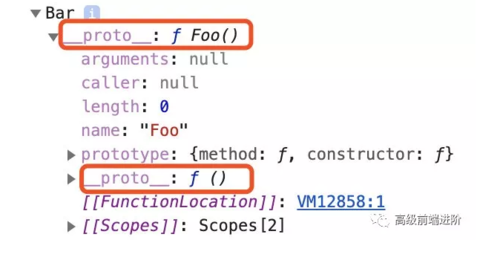
instanceof 原理及实现
instanceof 运算符用来检测 constructor.prototype 是否存在于参数 object的原型链上。
// 木易杨
function C(){}
function D(){}
var o = new C();
o instanceof C; // true,因为 Object.getPrototypeOf(o) === C.prototype
o instanceof D; // false,因为 D.prototype 不在 o 的原型链上
instanceof 原理就是一层一层查找 __proto__,如果和 constructor.prototype 相等则返回 true,如果一直没有查找成功则返回 false。
instance.[__proto__...] === instance.constructor.prototype
知道了原理后我们来实现 instanceof,代码如下。
// 木易杨
function instance_of(L, R) {//L 表示左表达式,R 表示右表达式
var O = R.prototype;// 取 R 的显示原型
L = L.__proto__;// 取 L 的隐式原型
while (true) {
// Object.prototype.__proto__ === null
if (L === null)
return false;
if (O === L)// 这里重点:当 O 严格等于 L 时,返回 true
return true;
L = L.__proto__;
}
}
// 测试
function C(){}
function D(){}
var o = new C();
instance_of(o, C); // true
instance_of(o, D); // false
原型链继承
原型链继承的本质是重写原型对象,代之以一个新类型的实例。如下代码,新原型 Cat 不仅有 new Animal() 实例上的全部属性和方法,并且由于指向了 Animal 原型,所以还继承了Animal 原型上的属性和方法。
// 木易杨
function Animal() {
this.value = 'animal';
}
Animal.prototype.run = function() {
return this.value + ' is runing';
}
function Cat() {}
// 这里是关键,创建 Animal 的实例,并将该实例赋值给 Cat.prototype
// 相当于 Cat.prototype.__proto__ = Animal.prototype
Cat.prototype = new Animal();
var instance = new Cat();
instance.value = 'cat'; // 创建 instance 的自身属性 value
console.log(instance.run()); // cat is runing
原型链继承方案有以下缺点:
1、多个实例对引用类型的操作会被篡改
2、子类型的原型上的 constructor 属性被重写了
3、给子类型原型添加属性和方法必须在替换原型之后
4、创建子类型实例时无法向父类型的构造函数传参
问题 1
原型链继承方案中,原型实际上会变成另一个类型的实例,如下代码,Cat.prototype 变成了 Animal 的一个实例,所以 Animal 的实例属性 names 就变成了Cat.prototype 的属性。
而原型属性上的引用类型值会被所有实例共享,所以多个实例对引用类型的操作会被篡改。如下代码,改变了 instance1.names 后影响了 instance2。
// 木易杨
function Animal(){
this.names = ["cat", "dog"];
}
function Cat(){}
Cat.prototype = new Animal();
var instance1 = new Cat();
instance1.names.push("tiger");
console.log(instance1.names); // ["cat", "dog", "tiger"]
var instance2 = new Cat();
console.log(instance2.names); // ["cat", "dog", "tiger"]
问题 2
子类型原型上的 constructor 属性被重写了,执行 Cat.prototype = new Animal() 后原型被覆盖,Cat.prototype 上丢失了 constructor 属性, Cat.prototype 指向了Animal.prototype,而 Animal.prototype.constructor 指向了 Animal,所以 Cat.prototype.constructor 指向了 Animal。
Cat.prototype = new Animal();
Cat.prototype.constructor === Animal
// true
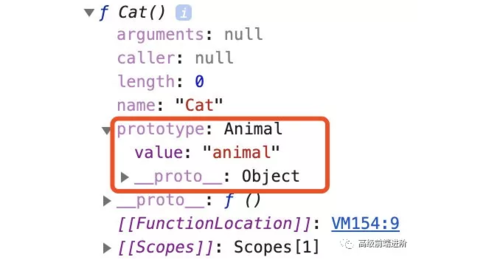
解决办法就是重写 Cat.prototype.constructor 属性,指向自己的构造函数 Cat。
// 木易杨
function Animal() {
this.value = 'animal';
}
Animal.prototype.run = function() {
return this.value + ' is runing';
}
function Cat() {}
Cat.prototype = new Animal();
// 新增,重写 Cat.prototype 的 constructor 属性,指向自己的构造函数 Cat
Cat.prototype.constructor = Cat;
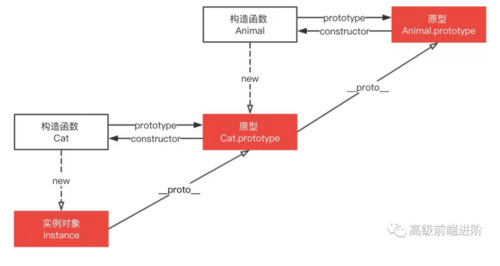
问题 3
给子类型原型添加属性和方法必须在替换原型之后,原因在第二点已经解释过了,因为子类型的原型会被覆盖。
// 木易杨
function Animal() {
this.value = 'animal';
}
Animal.prototype.run = function() {
return this.value + ' is runing';
}
function Cat() {}
Cat.prototype = new Animal();
Cat.prototype.constructor = Cat;
// 新增
Cat.prototype.getValue = function() {
return this.value;
}
var instance = new Cat();
instance.value = 'cat';
console.log(instance.getValue()); // cat
属性遮蔽
改造上面的代码,在 Cat.prototype 上添加 run 方法,但是 Animal.prototype上也有一个 run 方法,不过它不会被访问到,这种情况称为属性遮蔽 (property shadowing)。
// 木易杨
function Animal() {
this.value = 'animal';
}
Animal.prototype.run = function() {
return this.value + ' is runing';
}
function Cat() {}
Cat.prototype = new Animal();
Cat.prototype.constructor = Cat;
// 新增
Cat.prototype.run = function() {
return 'cat cat cat';
}
var instance = new Cat();
instance.value = 'cat';
console.log(instance.run()); // cat cat cat
那如何访问被遮蔽的属性呢?通过 __proto__ 调用原型链上的属性即可。
// 接上
console.log(instance.__proto__.__proto__.run()); // undefined is runing
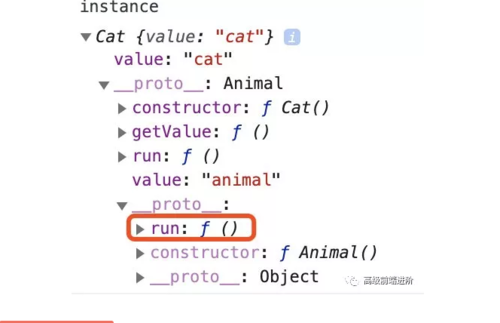
其他继承方案
原型链继承方案有很多问题,实践中很少会单独使用,日常工作中使用 ES6 Class extends(模拟原型)继承方案即可,更多更详细的继承方案可以阅读我之前写的一篇文章,欢迎拍砖。
点击阅读:JavaScript 常用八种继承方案
扩展题
有以下 3 个判断数组的方法,请分别介绍它们之间的区别和优劣
Object.prototype.toString.call() 、 instanceof 以及 Array.isArray()
参考答案:https://github.com/Advanced-Frontend/Daily-Interview-Question/issues/23
小结
每个对象拥有一个原型对象,通过
proto指针指向上一个原型 ,并从中继承方法和属性,同时原型对象也可能拥有原型,这样一层一层,最终指向null,这种关系被称为原型链当访问一个对象的属性 / 方法时,它不仅仅在该对象上查找,还会查找该对象的原型,以及该对象的原型的原型,一层一层向上查找,直到找到一个名字匹配的属性 / 方法或到达原型链的末尾(
null)。原型链的构建依赖于
proto,一层一层最终链接到null。instanceof 原理就是一层一层查找
proto,如果和constructor.prototype相等则返回 true,如果一直没有查找成功则返回 false。原型链继承的本质是重写原型对象,代之以一个新类型的实例。

 随时随地看视频
随时随地看视频



